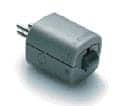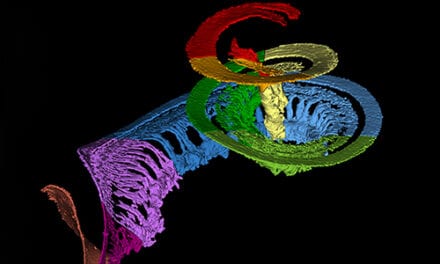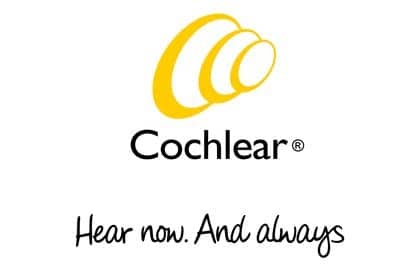
Stephan Sagolla, president of US operations, Interton
|
Established in 1962 by Hellmuth J. Türk and Hans-Herbert Türk near Cologne, Germany, today Interton manufactures hearing instruments that are available in more than 50 countries around the world. Interton US employs 128 people in its Plymouth, Minn, facility where its operations are overseen by Jim Hammarsted, general manager and vice president of operations; Brian Bender, executive director of marketing and sales; and president of Interton US, Stephan Sagolla, who is also managing director of Interton International.
Interton provides a full line of digital hearing products along with unique technology for a variety of hearing loss situations. In April 2004, the company launched the first wireless ITE to ITE Contralateral Routing of Signal (CROS) instruments as part of its mission to provide a broad range of hearing solutions.
According to Bender, “This mission is the basis for Interton’s research and development strategy. The company focuses internally on hybrid development, as well as forging beneficial alliances with other technology-driven industries, in order to develop unique solutions for challenging hearing loss situations.” Bender notes that, in addition to CROS, Interton’s recent technological accomplishments include the 2001 release of SilFlex, a soft-solid shell material—originally developed for medical implants—for patients who have difficulty getting a secure fit with traditional acrylic shell material; the 2002 launch of Finesse, the only digital instrument that does not incorporate input compression or WDRC, yet provides maximum sound benefits to patients, while bridging the gap for patients transitioning from non-WDRC or linear instruments to digital instruments; and the 2003 premiere of the high-end digital hearing solution IQ.
Hearing Products Report (HPR) recently had the opportunity to discuss Interton’s creative solutions, partnerships, and product base with Brian Bender.
HPR: Interton produces its own digital technology, such as a digital signal processing (DSP) feature. How is this DSP technology different from that of Interton’s competitors?
Bender: We are currently the only manufacturer offering a completely digital CROS/BiCROS system in both BTE and ITE configurations. Additionally, IQ custom and BTE products offer Adaptive Beam Forming (ABF), a sophisticated directional microphone mode. ABF positions the null, or the angle of attenuation, toward the location of the noise source. When the sound source moves in space, ABF moves the directivity pattern to correspond with it, reducing the noise and maximizing the signal to noise ratio. In quiet environments, ABF functions as an omni-directional microphone. The directional mode of IQ TWIN products can be set independently in each memory. Switching between ABF, standard directional, and omni is done automatically, making IQ one of the only systems that offers this amount of flexibility for directionality options.
Later this year, Interton will release a new family of digital instruments with Adaptive Dynamic Range Optimization (ADRO). ADRO technology was originally used in cochlear implants. Interton partnered with Dynamic Hearing, an Australian digital software solution provider, to make the technology available in hearing instruments. ADRO is the only processing scheme that exploits the capabilities of modern digital hybrids, giving it numerous advantages over other technology. ADRO is not simply a digital representation of conventional amplification but instead represents a completely new method of hearing aid signal processing. It is based on statistical properties of the actual listening environment rather than look-up tables. The fitting process for ADRO instruments is based on comfort levels, audibility, and maximum output parameters. Comfort and audibility rules are monitored in real time, and adjustments are made whenever necessary, giving the user a uniquely pleasant listening experience.
HPR: Has Interton developed any specific hearing products around this technology? Who are the ideal consumers for these products?
Bender: This product line will be aimed at first-time users. The sound quality and capabilities of ADRO processing will shorten the acclimatization period of new users.
HPR: How does Interton market to its consumers and dispensers? How do you help distributors with their marketing efforts?
Bender: Interton markets to its consumers and dispensers by offering a full array of products that are supported with excellent service and quality manufacturing. In addition, Interton offers a host of support materials for the patient and dispenser alike in its No Hassles Package included with IQ. We make choosing IQ easier and more advantageous for the consumer. For example, each IQ sold comes with a 3-year repair and loss & damage warranty, a 3-year supply of batteries, 3-year wax protection replacements, and a free technology upgrade, good for one future upgrade when released.
HPR: With digital dominating the market, where do we go from here? What is the next technological leap in hearing products?
Bender: As an industry, we’ve barely tapped the potential of digital processing. Currently, instruments use digital representations of analog processing solutions. Our research and development is leading us toward finding true digital processing solutions and moving away from those rooted in an analog processing scheme. Instead of the current analog-based amplification strategies, which were developed to resolve issues caused by amplification (such as feedback and multiple memories), new strategies will lead to patient-specific applications.
HPR: Has Interton become an advocate in the recent campaign to educate the public about hearing health care? If so, what tactics does the company use in educating the consumer and distributor?
Bender: Interton is a strong supporter in raising hearing health awareness for consumers. Our president, Stephan Sagolla (who is also president elect of the Better Hearing Institute), Dr Todd Fortune, who heads our US research and development, and I are members of the Better Hearing Institute Technical Advisory Board.
HPR: Does Interton plan to expand its product lines in the future?
Bender: Yes, we do. We have several joint projects in the pipeline. Specifically, our alliance with Dynamic Hearing, a company recognized for its cochlear implant and hearing aid innovation, will result in a new product release later this year. It will be a combination of Interton’s digital signal processing and Dynamic Hearing’s ADRO processing strategy. ADRO has been used successfully in cochlear implants.
HPR: Are there any plans to partner with other hearing health care companies for future projects?
Bender: Yes, we are currently in the process of developing more relationships with different companies based on areas of expertise.
HPR: What type of presence does Interton expect to have in the hearing health care industry in the next 10 years?
Bender: Globally, Interton has earned a reputation as one of the world’s most renowned suppliers of hearing aids. Prior to Interton establishing its own presence in the United States, Interton served as an original equipment manufacturer for several US-based hearing instrument providers. In the fall of 2001, Interton acquired Authorized Hearing Systems. With an established presence, Interton intends to aggressively grow its market share in the United States during the next 10 years.
Laura Horan is a contributing writer for Hearing Products Report.





